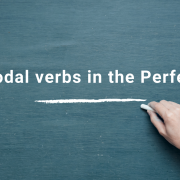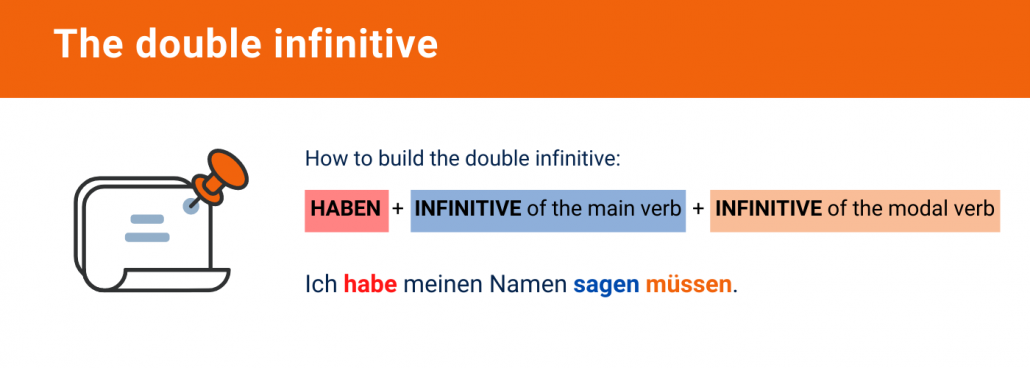The German Perfekt and modal verbs: gesagt or sagen?
Building the German Perfekt with modal verbs: the double infinitive
“I had to say my name”…
Would you know how to translate this sentence into German? If the answer is no, you may want to keep reading this article. Sure, you can use the Präteritum and say “Ich wollte meinen Namen sagen”, but what if you want to use the Perfekt? In the following paragraphs, we will teach you how to conjugate modal verbs in the perfect tense. You will see, it is easier than you think!
A step back: the Perfekt
The perfect tense (Perfekt) is used to speak about an event that took place in the past. This tense is formed by combining an auxiliary verb and a past participle (Partizip II). The auxiliary verb can either be “haben” or “sein”, depending on the main verb, and it must be conjugated according to the subject.
Sie hat gegessen. – She ate.
Er ist nach London gefahren. – He went to London.
The Perfekt and modal verbs
Modal verbs can also be conjugated in the perfect tense. If the modal verb is used alone, we build the Perfekt with the auxiliary „haben” and the past participle of the modal verb, just like we have just seen. Again, the auxiliary has to be conjugated to agree with the subject.
Ich habe ein Glas Wasser gewollt. – I wanted a glass of water.
Sie hat Deutschland gemocht. – She liked Germany.
However, when there is no full verb in the sentence, we generally use the Präteritum of the modal verb.
Ich wollte ein Glas Wasser. – I wanted a glass of water.
Sie mochte Deutschland. – She liked Germany.
More often than not, a modal is used with another verb. In order to build the perfect tense, we use a specific structure called the double infinitive. Here is an example:
Ich habe nach Berlin fahren wollen. – I wanted to go to Berlin.
The Double Infinitive
Let’s go back to the sentence we were talking about in the first place.
Ich habe meinen Namen sagen müssen. – I had to say my name.
To conjugate modal verbs in the Perfekt, we still need the auxiliary “haben” (conjugated in accordance to the subject). The difference here is made by the two infinitives at the end of sentence. That is why we call this “double infinitive”. In particular, we should put the infinitive form of the main verb first and then the infinitive form of the modal verb.
Remember to always put the two infinitives at the end. If there are some complements, these should be put between the auxiliary and the two infinitives or at the beginning of the sentence.
Ich habe meiner Mutter beim Hausputz helfen müssen. – I had to help my mother clean the house.
Gestern habe ich meiner Mutter beim Hausputz helfen müssen. – Yesterday I had to help my mother clean the house.
Let’s practice
Was hast du gestern machen müssen? – What did you have to do yesterday?
Und was hast du gestern machen wollen? – What did you want to do yesterday?
Try to answer these two questions using the double infinitive. You can make more than one sentence for each answer.
Examples:
Ich habe gestern lernen müssen. – Yesterday I had to study.
Ich habe gestern lesen wollen. – Yesterday I wanted to read.
Learn German with Berlino Schule
Learning German doesn’t have to painful. Berlino Schule’s highly qualified teachers will teach you everything you need to know in a simple way. Our school is rated 4.9/5 on Google and its average reviwe on Facebook is 5/5. If you want to know more about us, have a look at our website. For any information, you can send as an email at info@berlinoschule.com.
Our contacts
Gryphiusstraße 23, 10245 Berlin-Friedrichshain
+49 030 36465765
info@berlinoschule.com
Facebook page
Instagram profile


